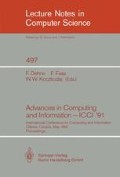Abstract
In this paper, we study the fault-tolerance of a large class of networks, whose underlying communication topology is a quasi-minimal Cayley graph, by studying their connectivity. Many “benchmark” parallel networks are included in this class, such as hypercube networks, butterfly networks, cube-connected cycles networks, double ring networks and star networks. Our main result is a proof that all quasi-minimal Cayley graphs have connectivity equal to their degree. This theorem generalizes results of Godsil [Go] and Akers and Krishnamurthy [AK]. We employ a proof technique which differs substantially from previous ones used to study the connectivity of highly symmetric graphs and, in particular, our method constitutes a more constructive approach to the problem. Based on our results, we are also led to suggest a hierarchical method for the packaging of a parallel network that provides the network with a high degree of fault-tolerance.
(Extended Abstract)
Preview
Unable to display preview. Download preview PDF.
6. References
S.B. Akers and B. Krishnamurthy (1987): On group graphs and their fault tolerance. IEEE Trans. Comp., C-36, 885–888.
F. Annexstein, M. Baumslag, A.L. Rosenberg (1990): Group action graphs and parallel architectures. Siam J. Computing, Vol. 19, No. 3, 544–569.
B. Bollobas (1978): Extremal graph theory, Academic Press.
H.S.M. Coxeter, W.O.J. Moser (1972): Generators and Relations for Discrete Groups, 3rd ed., Springer-Verlag, Berlin.
C.D. Godsil (1981): Connectivity of minimal Cayley graphs. Arch. Math., Vol. 37, 473–476.
A.C. Green (1975): Structure of vertex-transitive graphs. Journal of Combinatorial Theory, Series B 18, 1–11.
Y.O. Hamidoune (1984): On the connectivity of Cayley digraphs. European J. of Combinatorics 5, 309–312.
W. Imrich (1979): On the connectivity of Cayley graphs. Journal of Combinatorial Theory, Series B 26, 323–326.
W. Mader (1971): Eine Eigenschaft der Atome endlicher Graphen. Arch. Math. (Basel) 22, 333–336.
D.J.S. Robinson (1980): A Course in the Theory of Groups, Springer-Verlag.
G. Sabidussi (1964): Vertex-transitive graphs. Monatsh. Math. 63, 124–127.
M.E. Watkins (1969): Some classes of hypoconnected vertex-transitive graphs. Recent Progress in Combinatorics; Proceedings of the Third Waterloo Conference on Combinatorics, Edited by W.T. Tutte & C.St.J.A. Nash-Williams, Academic Press, New York.
M.E. Watkins (1970): Connectivity of transitive graphs. Journal of Combinatorial Theory, 8, 23–29.
H.P. Yap (1986): Some Topics in Graph Theory, London Mathematical Society Lecture Note Series 108, Cambridge University Press.
Author information
Authors and Affiliations
Editor information
Rights and permissions
Copyright information
© 1991 Springer-Verlag Berlin Heidelberg
About this paper
Cite this paper
Baumslag, M. (1991). On the fault-tolerance of quasi-minimal cayley networks. In: Dehne, F., Fiala, F., Koczkodaj, W.W. (eds) Advances in Computing and Information — ICCI '91. ICCI 1991. Lecture Notes in Computer Science, vol 497. Springer, Berlin, Heidelberg. https://doi.org/10.1007/3-540-54029-6_192
Download citation
DOI: https://doi.org/10.1007/3-540-54029-6_192
Published:
Publisher Name: Springer, Berlin, Heidelberg
Print ISBN: 978-3-540-54029-8
Online ISBN: 978-3-540-47359-6
eBook Packages: Springer Book Archive

